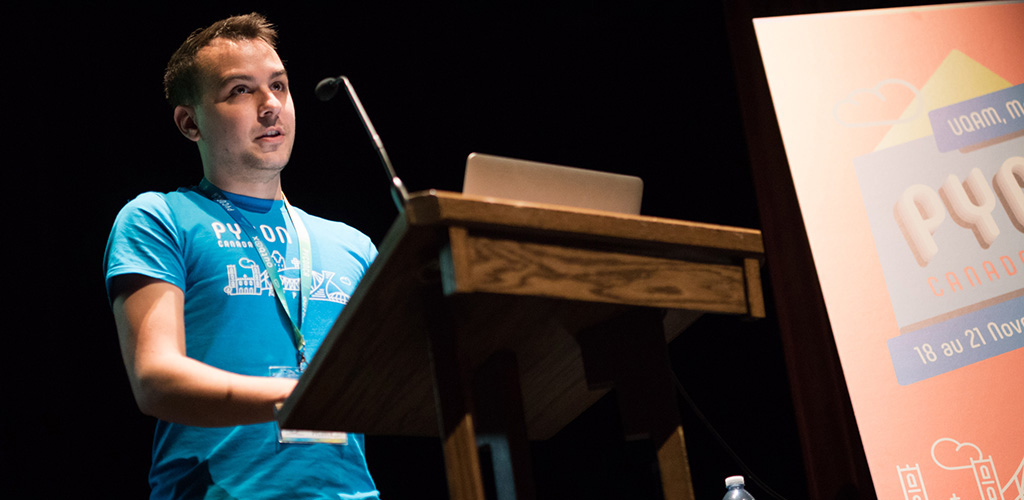This past weekend I gave a talk at the Canadian University Software Engineering Conference (CUSEC) here in Montréal, which is a big annual gathering of computer science students looking to jumpstart their future careers in tech. I had given a few talks at local meetups on my past open source project, arkOS, but recently I've decided to give it a go again at a couple different events. I really enjoy attending conferences, and it's a great privilege to be invited to speak at one every now and then!
Now that I've got a couple of talks under my belt, for local meetups and national conferences alike, here are a few things I've learned that I think are pertinent for those considering a start in public speaking.
Start with Lightning Talks

Oftentimes at conferences (especially tech conferences) a specific period of time will be set aside for what are called "lightning talks". These are talks of anywhere from 5 to 15 minutes each that are organized in a less rigid manner to encourage spontaneity and a variety of interesting subjects from conference-goers. If you want to present work on one of your recent projects, but are nervous about performing in front of a large amount of people right away, or don't have quite enough material for a full presentation, lightning talks are a great way to start and to hone your skills!
Each conference will structure their lightning talks in a different way — some require you to submit during the CFP (talk proposals) process, others allow you to propose and schedule one on-site during the conference — so make sure you check out the policy in advance.
Any Experience is Welcome
I know that, from personal experience, submitting a talk idea to a conference can be an intimidating process. For me, this was initially because of the thought that I was far from being the smartest person in the room! Tech conferences (especially large regional or national conferences) will attract a lot of experts in their individual fields. This is a great thing, as there usually isn't a shortage of smart people to learn from and to network with.
But here's the thing — these big conferences attract a pretty wide variety of people, including a lot of intermediates as well as juniors and people just getting started in the field. And these people also need to hear talks that are tailored to their interests or experiences. It does no good for a conference to field 150 expert-level talks on nuclear physics when people who are only at the high school level are also attending in droves.
So, with that in mind, you don't have to be an expert to propose a talk. You only need to have an experience that is worth sharing, and that other people could learn something useful from. Identify a target audience of any skill level that will be attending the conference and speak to their needs as they are connected to your past experience. Case in point: I gave a talk at PyCon Canada last year on a subject that was oriented towards beginners to Python and front-end Web development, and being a full-stack developer, I'm not a full-on expert in either one of those things.
Have a Conversation

My talk at CUSEC this past weekend was on a non-technical subject: how university students just getting into the field can use Stoic philosophy to avoid common stresses and pitfalls when starting their new careers as software engineers. Even though this talk was non-technical in nature, I probably enjoyed giving it even more than my prior technical talks. Why is that?
This talk was structured in a much more conversational way than my past talks. It included a long section where I explained my history in developing arkOS and had to deal with the "impostor syndrome" that came with working under a (relatively) high profile during its crowdfunding campaign. I tried to keep my notes at a minimum, and simply relate the story as it happened to me — just as if I was retelling the whole thing to a new friend I met. I made an effort to maintain this conversational style throughout the rest of the talk, and to avoid lecturing particular points or having to dive into extended explanations of anything in particular.
So, in doing this, I was far more relaxed with my audience. I felt like I made fewer mistakes, and even got more laughs from my audience in adding jokes in spontaneously rather than using the ones I had "programmed" in my slides beforehand. This kind of structure will obviously not work for every kind of talk, but if you feel like you will have trouble with nervousness or following a defined outline, try to tell a story and engage your audience in a conversation.
Find a Conference or Subject
Here are some lists and articles you may find helpful when preparing a talk idea or looking for cool conferences to attend or speak at:
